Kidneys, the unsung heroes of our bodies, are bean-shaped organs approximately 10 to
12 cm in length, nestled on either side of the backbone. Each kidney boasts a
complex structure with around 1 million nephrons, the functional units responsible
for myriad functions, including waste filtration. Let’s explore some common
kidney conditions – Stones, cancer/tumor, cysts, and swelling (hydronephrosis)- and
explore their symptoms, causes, and treatment options
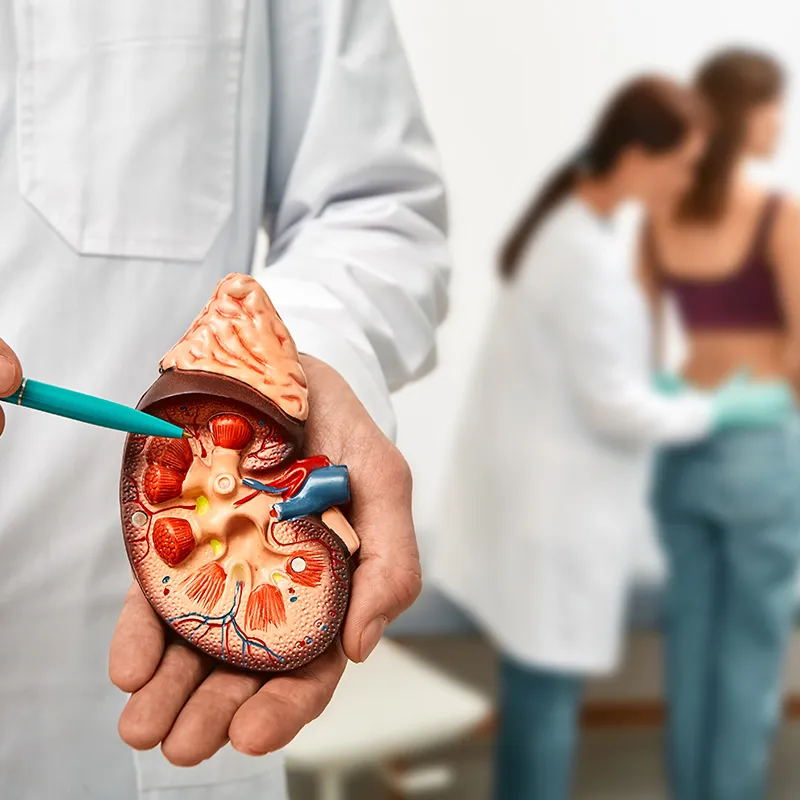
Kidney Stones:
What is a Kidney Stone?
Kidney stones, also known as renal calculi, are hard deposits that form in the kidneys. These stones can vary in size and composition and may be made up of various minerals and salts. The most common types of kidney stones include calcium oxalate stones, calcium phosphate stones, uric acid stones, and struvite stones. Kidney stones form when there is an imbalance in the substances that make up urine, such as calcium, oxalate, and phosphorus. When these substances are present in high concentrations, they can crystallize and clump together, forming solid masses. The stones can range in size from a grain of sand to a golf ball.Explore cutting-edge solutions for kidney at the renowned Excel Advanced Urology Centre in Delhi
Take the first step towards better health by scheduling a consultation below Schedule ConsultationKidney Stone symptoms and signs?
The symptoms and signs of kidney stones can vary depending on the size and location of the stone. Common symptoms and signs of kidney stones include:- Severe Pain: The most characteristic symptom of kidney stones is intense pain, usually located in the back or side below the ribs. The pain can radiate to the lower abdomen and groin. This pain is often described as sharp and cramp-like.
- Hematuria (Blood in Urine): Kidney stones can cause blood to appear in the urine, giving it a pink, red, or brown color. This occurs when the stone irritates the lining of the urinary tract or causes injury to the tissues.
- Frequent Urination: Individuals with kidney stones may experience an increased urge to urinate, and the process may be painful.
- Painful Urination: The act of urination can be accompanied by a burning or painful sensation, especially if the stone is causing irritation as it passes through the urinary tract.
- Cloudy or Foul-Smelling Urine: Kidney stones can lead to changes in the appearance and odor of urine.
- Nausea and Vomiting: Some people may experience nausea and vomiting, particularly if the pain is severe.
- Fever and Chills: In cases where a kidney stone causes an infection, symptoms like fever and chills may occur. This is more common with certain types of stones, such as struvite stones.
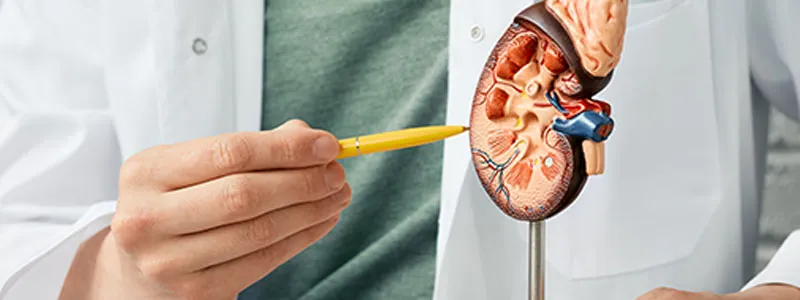
Procedures to treat Kidney Stones?
RIRS – RIRS is a minimally invasive procedure to treat kidney stones. It involves accessing the kidney through the natural urinary tract without the need for incisions. A thin, flexible ureteroscope is inserted through the urethra and guided to the kidney. Laser energy is then used to break down and fragment the stones, which are later naturally passed through urine. It is Less invasive, reduces recovery time, and is generally suitable for smaller stones.
PCNL –
PCNL is a surgical procedure for larger kidney stones. It involves making a
small incision in the back to access the kidney directly. A nephroscope is
inserted through the incision to locate and remove the stones. Larger stones may
be broken down with ultrasonic or laser energy before extraction. It is
Effective for larger stones and often requires a shorter hospital stay compared
to traditional open surgery.
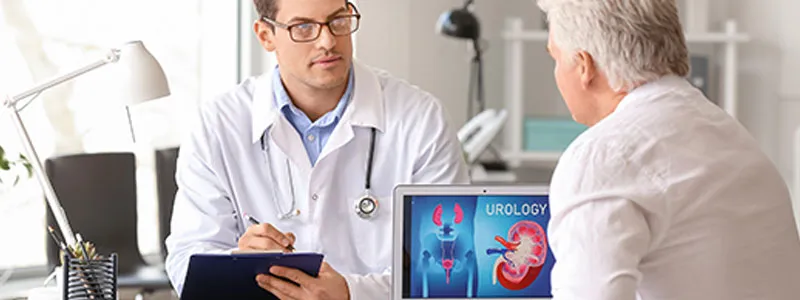
URSL –
URSL is a procedure that treats stones located in the ureter or kidneys using a
ureteroscope.A thin, flexible ureteroscope is passed through the urethra and
bladder into the ureter. Laser or pneumatic energy is used to break up or
disintegrate the stones for easier passage. Minimally invasive, suitable for
stones in the ureter, and often an outpatient procedure.
Explore cutting-edge solutions for kidney at the renowned Excel Advanced Urology Centre in Delhi
Take the first step towards better health by scheduling a consultation below Schedule ConsultationWhat causes Kidney Stones?
Kidney stones form when there is an imbalance in the substances that make up urine, leading to the crystallization of minerals and salts. Several factors can contribute to the development of kidney stones, and these include:- Dehydration: Insufficient fluid intake can lead to concentrated urine, making it easier for minerals and salts to crystallize and form stones.
- Dietary Factors:
- High Calcium Intake: Consuming too much calcium, especially in the form of calcium supplements, may contribute to the formation of calcium-based stones.
- High Oxalate Intake: Foods rich in oxalates, such as beets, chocolate, tea, and nuts, can contribute to the formation of calcium oxalate stones.
- High Sodium (Salt) Intake: Increased sodium levels in the diet can lead to higher calcium levels in the urine, increasing the risk of stone formation.
- Genetics: A family history of kidney stones may increase an individual’s susceptibility to developing stones.
- Medical Conditions:
- Hyperparathyroidism:
Overactivity of the parathyroid glands can lead to increased calcium levels in the
urine.
- Urinary Tract Infections (UTIs): Certain types of stones, such as struvite stones, can form as a result of urinary tract infections.
- Gout: High levels of uric acid in the blood can lead to the formation of uric acid stones.
- Cystinuria: An inherited disorder that causes the kidneys to excrete too much cystine, leading to the formation of cystine stones.
- Obstruction of Urinary Tract: Blockages or obstructions in the urinary tract can impede the flow of urine, increasing the risk of stone formation.
- Certain Medical Treatments: Some medical treatments, such as certain medications or procedures that affect the urinary tract, may contribute to the formation of kidney stones.
- Age and Gender: Men are generally more prone to developing kidney stones than women, and the risk increases with age.
- Geographic Location: Some geographic regions have a higher prevalence of kidney stones, possibly due to dietary and environmental factors.
Kidney Stones Test & diagnosis?
Diagnosing kidney stones typically involves a combination of medical history, physical examination, imaging studies, and laboratory tests. Here are the common methods used for testing and diagnosing kidney stones: Medical History and Physical Examination:- Your healthcare provider will ask about your medical history, including any previous episodes of kidney stones, family history, and your current symptoms.
- A physical examination may be performed to check for signs of pain, tenderness, or other indications of kidney stone-related issues.
- CT Scan (Computed Tomography ): This imaging technique is highly effective in detecting the presence, size, and location of kidney stones. It provides detailed cross-sectional images of the urinary tract.
- Ultrasound: Ultrasound imaging can visualize kidney stones, especially in cases where CT scans are not suitable, such as in pregnant individuals.
- X-rays: Some kidney stones, particularly those composed of calcium, are visible on plain X-rays. However, not all stones are easily seen with this method.
- Urinalysis: This involves analyzing a urine sample to check for the presence of blood, crystals, or other substances that may indicate kidney stones.
- Urine Culture: If there is suspicion of an associated infection, a urine culture may be performed to identify the specific bacteria causing the infection.
- Blood Tests: Blood tests may be conducted to assess kidney function and measure levels of certain minerals (e.g., calcium, uric acid). Abnormal levels may suggest a predisposition to kidney stone formation.
- Collecting urine over a 24-hour period allows for a comprehensive assessment of various factors, including the levels of calcium, oxalate, citrate, and other substances that may contribute to stone formation.
- If a kidney stone is passed or removed, it can be sent to a laboratory for analysis. Determining the composition of the stone helps guide treatment and preventive measures.
When should you see the Doctor?
It’s a good idea to see an urologist, if you suspect you have kidney stones or are experiencing any of the symptoms mentioned above, it is important to seek prompt medical attention. Kidney stones can lead to complications, such as urinary tract infections or obstruction of the urinary tract and may require intervention to alleviate symptoms and prevent further issues. Additionally, individuals with a history of kidney stones, a family history of kidney stones, or certain medical conditions that increase the risk of stone formation should consider regular check-ups with a healthcare provider to monitor their kidney health and take preventive measures. Early diagnosis and appropriate management can help in effectively treating kidney stones and preventing their recurrence.Why choose Excel Advanced Urology Centre Kidney Stone Specialist?
Dr Saini is a urologist with specialized training and experience in performing RIRS Surgery. He keeps up to date with the latest advances in RIRS Urology Procedures and techniques, ensuring that his patients receive the best possible care.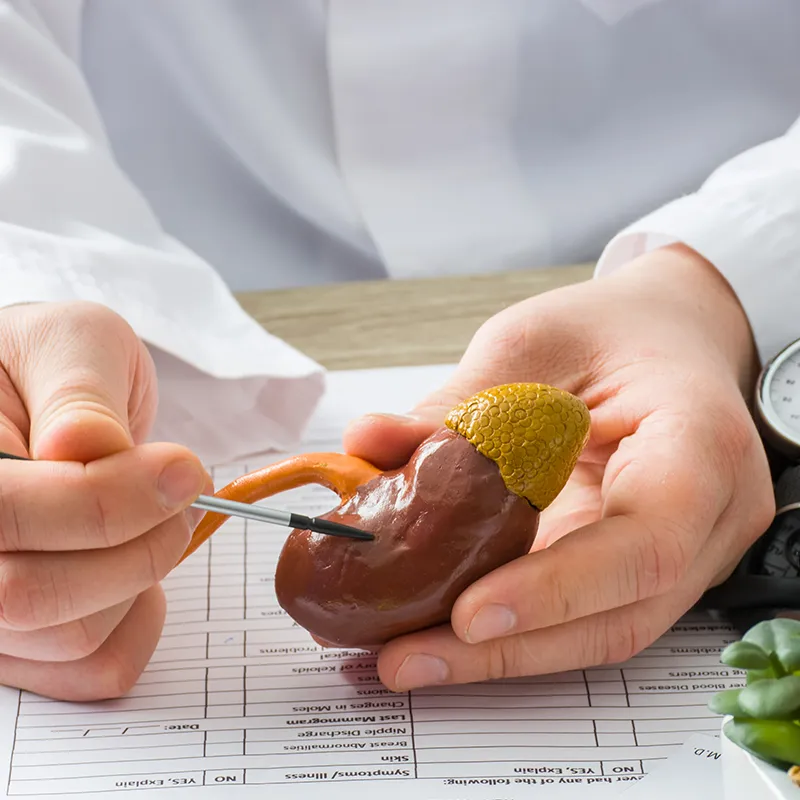
Kidney Cancer/Tumor:
What is Kidney Cancer?
Renal cell carcinoma, or kidney cancer, arises when cells in the kidneys grow uncontrollably, forming a tumor. Risk Factors for Kidney Cancer:- Smoking: Cigarette smoking significantly increases the risk of kidney cancer.
- Gender: Men are more susceptible to kidney cancer compared to women.
- Obesity: Hormonal changes associated with excess weight can elevate the risk of kidney cancer.
- Medications: Long-term use of certain pain medications may contribute to an increased risk.
- Dialysis: Individuals with advanced kidney disease or those on long-term dialysis face higher risks.
- Genetic Conditions: Certain genetic disorders, like von Hippel-Lindau (VHL) disease, heighten susceptibility.
- Family History: A family history of kidney cancer, especially among siblings, increases the risk.
- Chemical Exposure: Contact with specific chemicals like asbestos, cadmium, benzene, solvents, or herbicides.
- Blood Pressure: High blood pressure may contribute to an increased risk.
- Lymphoma: There is an unexplained higher risk of kidney cancer in individuals with lymphoma.
Symptoms of Kidney Cancer:
Common Symptoms:- Blood in the Urine: Hematuria.
- Abdominal Lump: Felt in the side or abdomen.
- Loss of Appetite: Unexplained decrease in hunger.
- Persistent Side Pain: Discomfort in the side that doesn’t alleviate.
- Unexplained Weight Loss: Without a known cause.
- Prolonged Fever: Lasting for weeks without an apparent infection.
- Extreme Fatigue: Unusual tiredness.
- Anemia: Low red blood cell count.
- Swelling: Particularly in ankles or legs.
- Shortness of Breath: If cancer spreads to the lungs.
- Coughing Up Blood: Lung involvement.
- Bone Pain: When cancer spreads to bones.
Treatments for Kidney Cancer:
- Surgery for Kidney Cancer:
- Nephrectomy: Surgical removal of the affected kidney.
- Partial Nephrectomy: Removal of the tumor while preserving the rest of the kidney.
- Biologic Therapy for Kidney Cancer: Immunotherapy: Boosting the body’s immune system to fight cancer cells.
- Targeted Therapy for Kidney Cancer: Medications: Drugs targeting specific molecules involved in cancer growth.
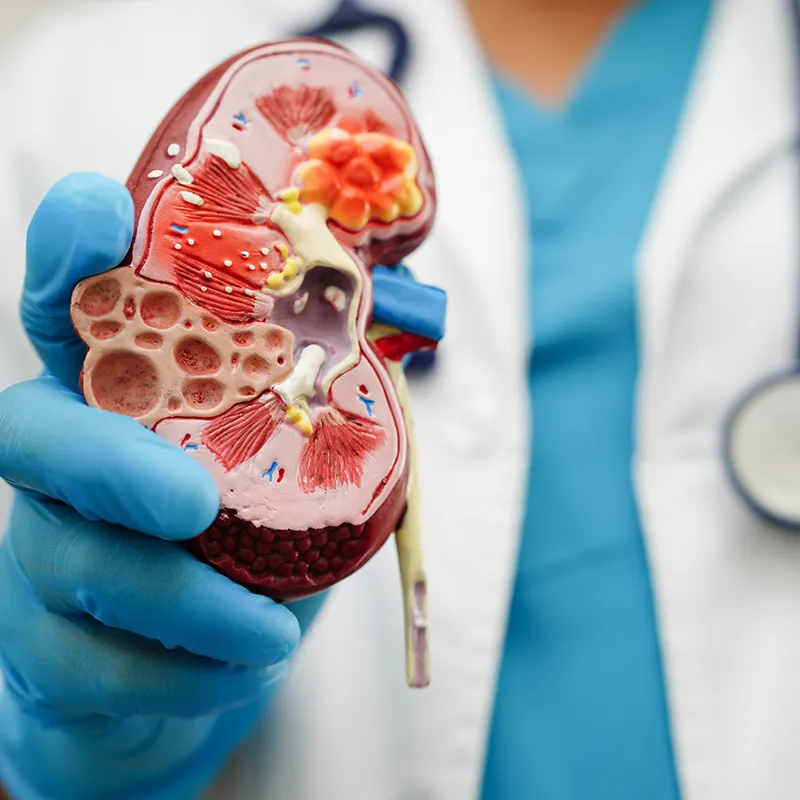
Kidney cysts
Kidney cysts are typically benign growths, posing no cancerous threat. Most individuals with kidney cysts remain asymptomatic, living without awareness of these cystsSymptoms:- While most people with kidney cysts are symptom-free, some may experience:
- High blood pressure
- Back and side pain
- Blood in the urine
- Frequent kidney infections
- Fever
- Abdominal pain
- Dull pain in the back or side
Diagnosis:
Kidney cysts are often incidentally discovered during abdominal ultrasound, CT scans, or MRI scans for unrelated health concerns. These imaging tests aid in distinguishing between cysts and tumors. Blood tests may be conducted to assess kidney function and determine if the cyst affects kidney performance. A detailed medical history regarding symptoms is also considered in the diagnostic process.Treatment:
Surgical intervention may be necessary if a kidney cyst causes symptoms, enlarges, or hinders kidney function. Treatment options include- Puncturing the Cyst: A thin needle is inserted through the skin into the cyst to drain fluid. The cyst is then filled with alcohol to prevent recurrence.
- Surgery: For larger cysts, surgical removal may be recommended. The surgeon uses small incisions, special tools, and a video camera to drain the cyst and eliminate its walls.
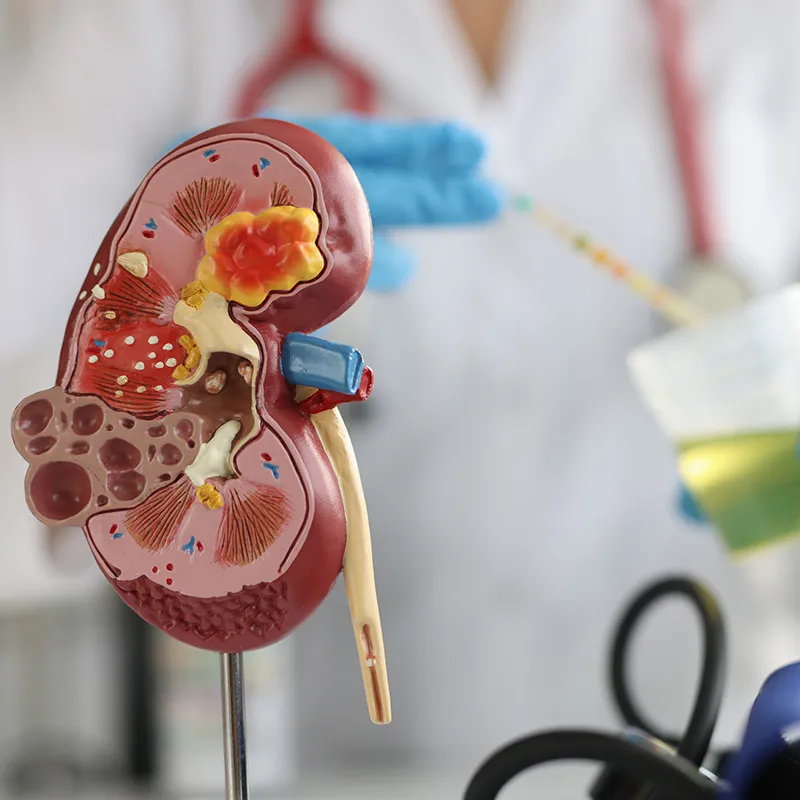
Kidney Swelling (Hydronephrosis) and Treatment
Kidney swelling, medically known as hydronephrosis, is characterized by the accumulation of urine in the kidneys due to an obstruction in the urinary tract. This obstruction prevents the normal flow of urine, leading to the dilation and swelling of the kidneys. Hydronephrosis can affect one or both kidneys and may vary in severity. Causes of Kidney Swelling:- Kidney Stones: Obstruction caused by kidney stones can lead to hydronephrosis.
- Tumors: Tumors in the urinary tract or surrounding areas can block urine flow.
- Enlarged Prostate: In men, an enlarged prostate gland can obstruct the urethra, causing hydronephrosis.
- Pregnancy: Pregnant women may experience hydronephrosis due to pressure on the ureters.
- Urinary Tract Infections (UTIs): Infections can lead to inflammation and blockage in the urinary tract.
- Congenital Conditions: Some individuals may have structural abnormalities from birth that contribute to hydronephrosis.
Symptoms of Kidney Swelling:
- Pain: Dull or severe pain in the back or side.
- Frequent Urination: Increased urge to urinate.
- Fever and Chills: In cases of infection.
- Blood in the Urine: Hematuria may occur.
- Nausea and Vomiting: Especially if hydronephrosis is severe.
- Imaging Tests: Ultrasound, CT scans, or MRI help visualize the kidneys and identify the presence of swelling.
- Urodynamic Studies: Assess the pressure and flow of urine in the urinary tract.
- Blood and Urine Tests: Evaluate kidney function and detect signs of infection.
- Relieving the Obstruction: If caused by kidney stones, tumors, or other obstructions, procedures may be done to remove or alleviate the blockage.
- Catheter Placement: A catheter may sometimes be inserted to drain urine from the affected kidney.
- Antibiotics: If Antibiotics are prescribed if hydronephrosis is due to a urinary tract infection.
- Surgery: Severe cases may require surgical intervention to correct structural issues or remove blockages.
- Pain Management: Medications may be prescribed to manage pain associated with hydronephrosis.

